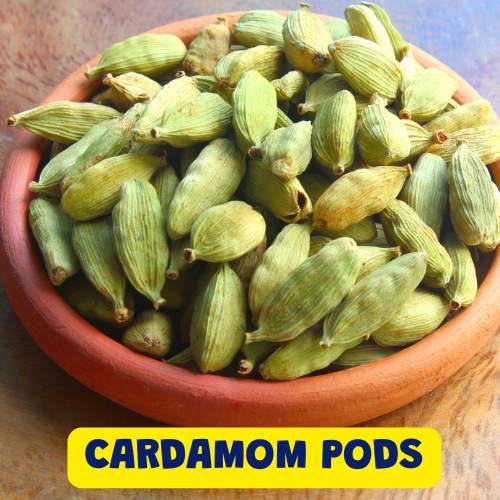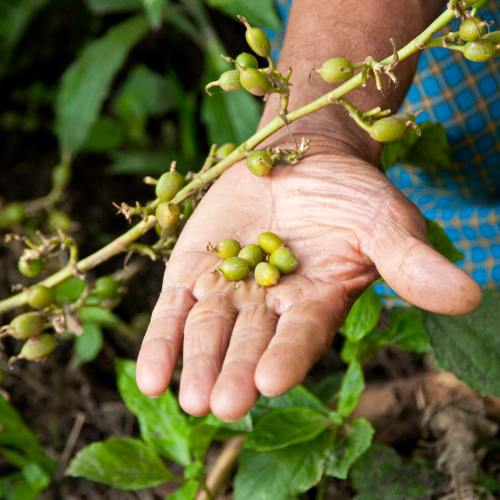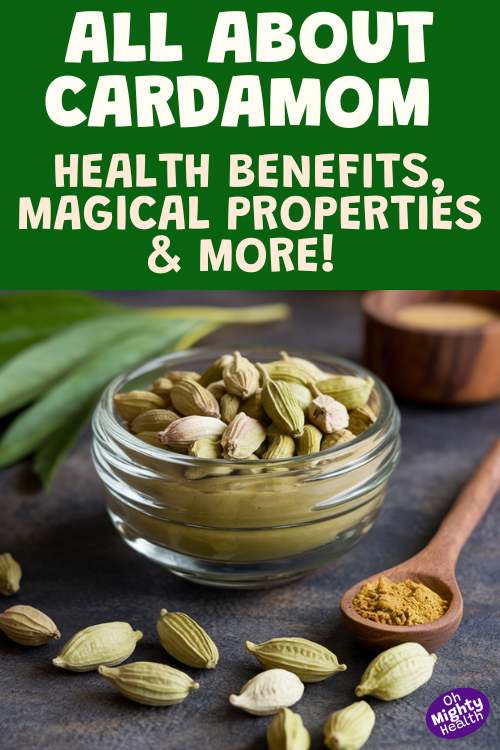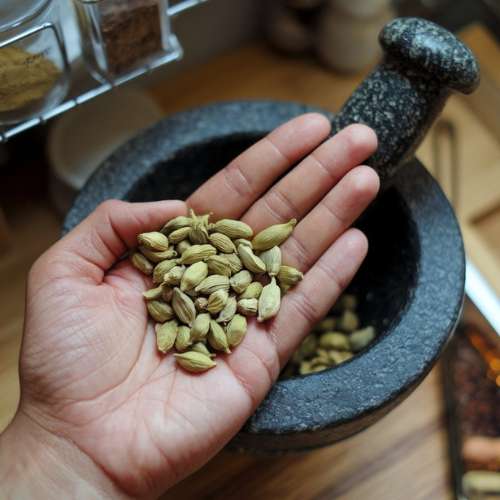Cardamom: Health Benefits, Uses & Magical Properties
Is it a spice? Is it a health booster? Or maybe… a touch of magic? 🌟
Cardamom has been around for centuries, charming its way into kitchens, remedies, and even rituals. Whether you’re here to jazz up your recipes, give your digestion some love, or explore its mystical vibes, cardamom’s is ready to deliver.
But what makes this spice so special? Is it the aromatic kick? The potential health benefits? Or its ancient connection to the mystical?
Let’s spill the (cardamom-infused) tea below. Keep reading to find out how this fascinating spice can fit into your life—and why it might just become your new favourite.

Latin Name
Cardamom belongs to the Elettaria cardamomum species, a member of the Zingiberaceae family, also known as the ginger family. 🌿 Its botanical name gives a hint to its spicy roots, as it shares similar warming properties to ginger, making it both a popular culinary ingredient and a valued herbal remedy.
Did you know cardamom was once considered so precious it was used as currency? That’s right—this tiny green pod was worth its weight in gold in ancient trade routes. From royal feasts in India to Viking bread recipes in Scandinavia, cardamom has travelled the world, leaving behind a trail of delicious history. Makes you wonder… what other secrets are hidden in this humble spice?
Taste/Fragrance
Cardamom offers a distinctive taste and fragrance that’s hard to miss. It’s aromatic and pungent, with a unique combination of sweet, spicy, and citrus-like notes. Its warming properties make it a delightful addition to both sweet and savoury dishes.
- Taste: Slightly sweet, warming, with citrus and spicy undertones.
- Fragrance: When crushed, cardamom seeds release a rich, aromatic scent that’s fresh and invigorating, often described as citrusy and spicy.
🌿 Tip: To get the best flavour and benefits from cardamom, use freshly crushed seeds right before cooking or preparing your remedy.
One of the oldest spices in the world and member of the ginger family, cardamom is a common spice used to flavour coffee, curies, rice, cakes, breads, etc. It was extensively used in Egypt to make perfumes. Cardamom pods contain up to 20 aromatic, dark red-brown seeds.
Parts Used
The seeds inside the green pods of cardamom are where its potency lies. When the pods are split open and the seeds crushed, they release an incredible burst of flavour and aroma.
- Seed: The small, dark, aromatic seeds are the most commonly used part of cardamom. These are often crushed to release their flavour and oils.
- Pods: While the seeds hold most of the spice’s power, the pods can also be used whole in teas, infusions, or added to curries for a milder flavour.
🌿 Tip: Always split the pods open and crush the seeds right before use to get the most out of cardamom’s volatile oils and potent properties.
Here’s a fun fact: cardamom isn’t just a spice—it’s a natural mouth freshener, too! Ancient Egyptians used to chew on its seeds to keep their breath minty fresh. Next time you’re out of mints, give it a try.

Main Constituents
Cardamom’s strength comes from its rich profile of volatile oils, which give it its strong aroma and health benefits. Here’s what makes cardamom such a powerhouse spice:
- Volatile oil (3-6%): Contains terpenes and terpineol, which give it its characteristic fragrance and medicinal properties.
- Cineol: A key component with antiseptic and anti-inflammatory properties.
- Alkaloids: Provide digestive benefits and are responsible for cardamom’s ability to support the nervous system.
- Flavonoids: Known for their antioxidant effects, they help fight free radicals.
- Saponins: These compounds support the immune system.
- Sterols: Contribute to heart health by managing cholesterol levels.
The higher the percentage of volatile oils in the seeds, the better quality the cardamom is.
What makes cardamom so irresistible? That warm, spicy aroma that fills the air the second you crack open a pod? Crush a pod, and BOOM! You’re hit with that unmistakable fragrance. It’s not magic—well, maybe a little—but mostly it’s down to the volatile oils. These oils are the heart and soul of cardamom, packed with terpineol and cineol, giving it that signature fragrance and a powerhouse of health benefits.
How to Use Cardamom: Easy, Everyday Ideas
So, you’ve got your cardamom pods or powder—now what? This spice is versatile enough to make its way into your kitchen, skincare routine, and even wellness rituals.
Here are some ideas to get you started:
In the Kitchen
- Spiced tea: Crush a few pods and add them to your tea for a warm, aromatic boost. Perfect for chai lovers! ☕
- Curries and stews: Toss in a pod or two while cooking for a rich, complex flavour that pairs beautifully with savoury dishes.
- Sweet treats: Sprinkle ground cardamom into cakes, cookies, or rice pudding for a subtle, fragrant sweetness.
For Wellness
- Digestive tonic: Feeling bloated? Brew cardamom seeds into a soothing herbal tea to ease discomfort.
- Natural mouth freshener: Chew on a pod for fresher breath and antimicrobial benefits—goodbye, bad breath! 🌬️
- Energy boost: Add a pinch of ground cardamom to your morning coffee or smoothie for a gentle pick-me-up.
Skincare and Beauty
- DIY face mask: Mix cardamom powder with agave syrup or maple syrup for a glow-boosting, antibacterial face mask.
- Relaxing bath: Add a few drops of cardamom essential oil diluted in a carrier oil like almond oil to your bath for a calming, spa-like experience.
A Little Extra Magic
- Meditation aid: Burn the essential oil during meditation for its grounding, calming aroma.
- Romantic touch: Sprinkle a little cardamom in your hot chocolate or dessert—it’s said to have aphrodisiac properties.
Cardamom isn’t just a spice—it’s a little pod of possibilities.
Below, you’ll find a complete guide to cardamom’s properties, benefits, uses, and safety tips—perfect for referencing whenever you need a deep dive into this incredible spice.
Actions / Properties
Cardamom is not just a spice—it’s a powerful herbal remedy with a range of therapeutic properties. Its unique blend of active compounds gives it multiple health benefits:
- Digestive Tonic: Say goodbye to bloating and indigestion. Cardamom soothes your stomach and supports healthy digestion.
- Antispasmodic: Helps relax muscle spasms—perfect for cramping and digestive discomfort.
- Liver Protector: Supports liver health and detoxification like a pro.
- Mild Stimulant: Need a mental pick-me-up? Cardamom boosts focus and clarity without the caffeine crash.
- Carminative: Banish gas and bloating with this gentle remedy.
- Antimicrobial: Fights bacteria—ideal for freshening breath and tackling minor infections.
- Aphrodisiac: Its warming properties have been said to kindle passion for centuries.

Medicinal Uses
Cardamom has been used for centuries to address a variety of health concerns, particularly for digestion and mental health. Here’s how it can support your well-being:
1. Digestive Health
Struggling with digestion? Cardamom can help:
- Relieves bloating, flatulence, and heartburn.
- Soothes nausea, vomiting, and gastritis.
- Combines well with other herbs to improve taste and effectiveness.
- Even counteracts discomfort caused by laxatives.
2. Mental Health
Feeling frazzled? Cardamom has your back:
- Reduces anxiety & stress: Calms nervous tension and promotes relaxation.
- Lifts your mood: A natural way to combat mild depression.
- Sharpens focus: Enhances mental clarity and concentration.
- Strengthens memory: A traditional remedy for better recall.
3. Women’s Health
A go-to in traditional remedies for women:
- Relieves menstrual cramps with its antispasmodic properties.
- Eases bloating and discomfort during PMS.

Culinary Uses
Cardamom is a key spice in many cuisines around the world, particularly in Indian, Middle Eastern, and Scandinavian dishes. Its complex flavour makes it versatile in both sweet and savoury recipes.
- In Mixtures: Often found in spice blends like garam masala and curry powders to add warmth and depth.
- In Curries: Adds a fragrant, slightly sweet note to curries and stews, balancing rich and spicy flavours.
- In Desserts: Widely used in baking, cardamom enhances cakes, sweet breads, pastries, and puddings with its aromatic sweetness.
- In Drinks: Popular in teas and coffees, such as masala chai and Arabic coffee, where it enhances the flavour with a subtle spice and floral undertone.
Magical Uses
Cardamom’s use extends beyond the kitchen, finding a place in magical practices where its energy is associated with love, luck, and protection.
- Love: Cardamom is believed to enhance passion and attraction. It can be added to love sachets or used in rituals to strengthen relationships.
- Luck: Used in spells and rituals to attract prosperity and good fortune, particularly in matters of business or career.
- Protection: Sprinkling cardamom in a space or incorporating it into incense is thought to offer protection and dispel negative energies.
- Amatory Pastries: Cardamom is sometimes baked into pastries to invoke passion and lust, particularly in romantic or intimate settings.
Indian Uses
In Ayurvedic and traditional Indian medicine, cardamom is a trusted remedy for a variety of ailments, especially those related to the respiratory and digestive systems.
- Asthma & Bronchitis: Cardamom is used to help open the airways, making it easier to breathe and reducing symptoms of asthma and bronchitis.
- Kidney Stones: Known to support kidney health, cardamom is used to ease the discomfort of kidney stones and support urinary health.
- Anorexia: In cases of loss of appetite or malnutrition, cardamom is used to stimulate appetite and support digestion.
Chinese Remedy
In Traditional Chinese Medicine (TCM), cardamom is used primarily for its warming and digestive properties. It is considered a valuable herb for balancing the body’s energies, especially when there is a need to regulate the digestive or urinary systems.
- Urinary Incontinence: Cardamom is used in Chinese remedies to support bladder health and address issues like urinary incontinence, promoting better control over urination and strengthening the urinary system.
Other Uses
Beyond its well-known medicinal and culinary applications, cardamom also has practical uses for common ailments and personal care.
- Bad Breath: Chewing cardamom seeds is a simple and effective way to freshen your breath, as its strong aroma helps neutralise odours.
- Sinusitis: Cardamom’s warming and aromatic properties can help clear sinus congestion. Chewing the seeds or adding them to hot water for inhalation may provide relief from sinus issues.
- Aphrodisiac: Cardamom is traditionally considered an aphrodisiac due to its stimulating effect, which is thought to enhance libido and vitality.
- Milk Drinks: When added to drinks made from milk, cardamom helps counter the mucus-producing effects of dairy, making it easier to digest for those prone to congestion.
- Tea and Coffee: Adding cardamom to tea or coffee helps balance the stimulating effects of caffeine, making it a popular choice in many cultures.
Safety ⚠️
While cardamom is generally safe for most people, it’s important to be aware of a few safety considerations before incorporating it into your routine.
- Allergies: If you’re allergic to spices in the ginger family, such as turmeric or ginger itself, it’s best to avoid cardamom or consult with a healthcare professional before using it.
- Pregnancy: While small amounts of cardamom used in cooking are generally considered safe, always consult your healthcare provider before using it medicinally during pregnancy.
- Gallstones: People with gallstones should be cautious when using cardamom, as it may stimulate bile production, which can aggravate symptoms.
- Essential Oil Use: Cardamom essential oil should always be diluted in a carrier oil before applying to the skin to avoid irritation. Perform a patch test to check for sensitivities, especially if you have sensitive skin.
Final Thoughts
Cardamom is truly a spice that transcends its culinary uses. From aiding digestion to calming the mind, this versatile herb has so much to offer for both the body and spirit.
Whether you’re brewing it into a comforting tea, adding it to your favourite dishes, or using it in magical rituals, cardamom’s warming and fragrant qualities can bring balance and healing into your life.
Start incorporating cardamom into your daily routine—whether through its health benefits, culinary uses, or magical properties—and experience the power of this ancient spice for yourself.

